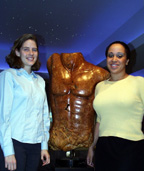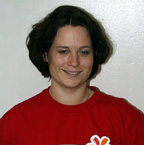 For three months after UNMC’s RESPECT Clinic opened, Theresa Spitzer wondered when the first patient would walk through the door.
For three months after UNMC’s RESPECT Clinic opened, Theresa Spitzer wondered when the first patient would walk through the door.
Dedicated to the diagnosis, treatment and education of sexually transmitted diseases among South Omaha’s underserved persons, the clinic didn’t receive a single patient between Oct. 3, 2001, and January. Since then, RESPECT (Responsible Early STD Prevention Education and Community Testing) has consistently served four to five patients each time it is open — a total of almost 40 patients as of May 1.
“We started a public sexual disease clinic in a largely Latino and Catholic community — it was a big learning curve,” said Spitzer (M-3), who was appointed student coordinator of the project in September 2001. “Yes, I had visions of patients flocking to the clinic, but those first months without any patients at all were sobering lessons in cultural awareness of our patient base. We had to spend a lot of time talking with staff from the SONA clinic and learning how to build the community’s trust. We learned South Omaha needed to see that we were committed, consistent, stable and would be very confidential.”
In September 2001, Marilyn Hallinan (M-2) submitted the acronym, RESPECT, in a naming contest for the clinic. The competition drew more than 50 entries and earned Hallinan the $100 cash prize. While she incorporated a lot of the technical aspects of the clinics mission to create her acronym, Hallinan also was inspired by soul singer Aretha Franklin’s classic hit refrain, “R-E-S-P-E-C-T, find out what it means to me.” 
Teaching the community about the RESPECT clinic became a mission in itself. RESPECT clinic volunteers distributed bilingual brochures about the clinic to retail and social outlets in South Omaha. They placed RESPECT business cards in hospital emergency rooms and clinics throughout Omaha, networking with physicians and encouraging their referrals.
Above all, they spoke with long-term community activists and social service workers who helped them understand why people are reluctant to seek such services at public clinics. Eventually, one at a time, referrals came from SONA, from emergency rooms where patients’ blood tests incidentally revealed an STD and from private clinics for patients with no insurance. Slowly, word-of-mouth referrals by patients themselves led to more patients.
Starting, running a clinic
RESPECT was created because there wasn’t a dedicated public STD clinic in South Omaha. People in need of such services had to travel to a North Omaha clinic, the Douglas County Health Clinic or the Nebraska AIDS Project center. At the North Omaha and Douglas County facilities they faced constantly overwhelmed staff and crowded waiting rooms.
RESPECT, which is staffed by five medical students, a nurse practitioner and two professional supervisors, is inside the SONA clinic at 31st and Q streets and is open from 6 to 8:30 p.m. every other Wednesday. Patients are asked only to pay a nominal fee of $10 per visit, but patients are not denied services if they cannot pay.
To date, RESPECT patients are equally divided between men and women and range in age from 18 years to their late 40s. While the women contracted their infections from a variety of sources, most of the men come in after being notified of a female sex partner’s infection or because they had recently had unprotected sex with a new partner and discovered discharges or other STD symptoms.
“Dr. Kate Fiandt has taught the staff a great set of protocols,” said Karina Skoog (M-3), who also served as the clinic’s public relations coordinator. “We really do an extensive history with each patient. Covering needles, tattoos, different aspects of sex, as well as recreational drug and alcohol use that may have led to unsafe behaviors. We have similar protocols for both men and women, but we talk with women more in-depth about physical safety and possible sex abuse in the home and bisexual partners. We want to really educate each patient to all the issues that may have led to their becoming at-risk for disease and how it can be avoided in the future. Our goal is not only to identify for treatment but also to try and break the cycle of re-infection.”
Training
Every student at RESPECT receives 16 hours of intensive training in HIV/AIDS education and counseling. Patients who test HIV positive are then referred to professional full-time counselors. Kate Fiandt, Ph.D., director of the RESPECT clinic, personally trains all the staff on all the medical instruments used for male and female patient examinations. A male medical student, for example, may never get a chance to perform a female pelvic examination, but he does at RESPECT. All medications are administered on site and patients are required to consume their medications under direct observation by the staff. In this combination of expertise, organization, caring and discipline, RESPECT began living up to its name.
“We treated three patients on my first night at the clinic and each had different health problems,” said Nancy Parks (M-3). “Not only did I really learn a lot about physical examination skills, but how to work with people who otherwise probably wouldn’t be receiving adequate health care for such a sensitive issue. It’s really rewarding to be able to focus on a particular health problem that can be diagnosed and treated in a single visit.”
In the 2002-2003 academic year, RESPECT will be coordinated by the administrators of the SHARING clinic, a student-run primary care clinic that is open each Tuesday evenings in the SONA building. With next year’s staff already selected, Spitzer reflected on her first opportunity to lead a health clinic from concept to reality. More than anything, she says, RESPECT made her feel like a doctor.
“I had several previous opportunities to work with sexual disease clinics in Jamaica and Atlanta, but I was actually in charge at RESPECT,” Spitzer said. “I have a great appreciation for how much work it takes to make a clinic run smoothly.
“It was extremely frustrating at times, but once we started developing a nightly patient load, it was so gratifying and worth it all. To see the program off and running now just fills me with pride in our student volunteers, faculty advisors and the great opportunities we receive at UNMC.”
Photos in descending order: 1) Karina Skoog and Theresa Spitzer; 2) Marilyn Hallinan.